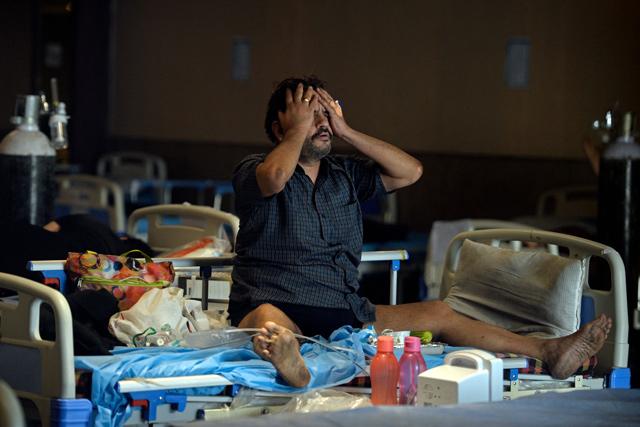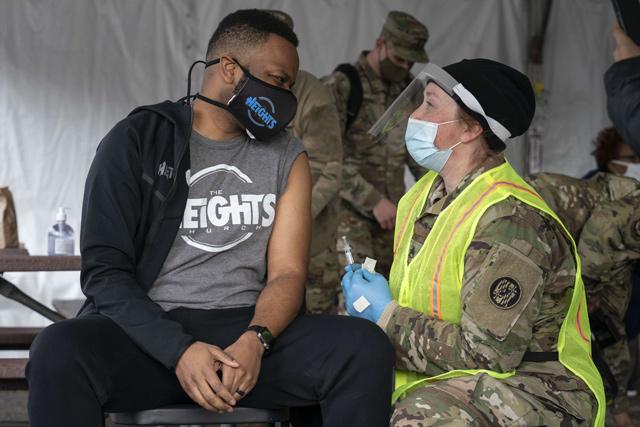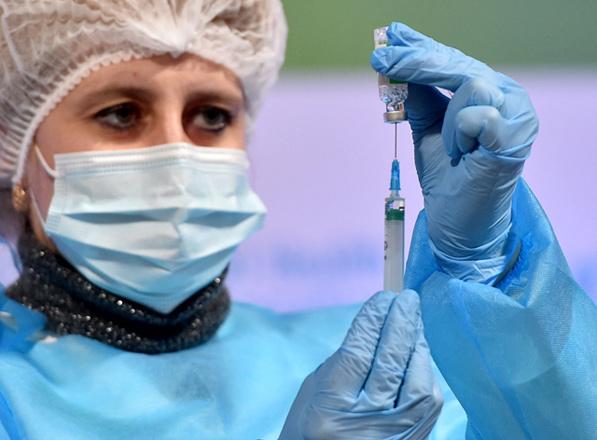You are here
Europe eases COVID-19 curbs as huge India outbreak persists
By AFP - May 11,2021 - Last updated at May 11,2021

A COVID-19 coronavirus patient reacts while sitting on a bed inside a banquet hall temporarily converted into a COVID care centre in New Delhi on Monday (AFP photo)
LONDON — Schools and stores reopened in several parts of Europe on Monday as the continent eased out of months of COVID-19 lockdowns, but India remained in the grip of a devastating outbreak.
Rapid vaccination programmes have allowed a number of wealthy nations to start taking steps towards normality, but the virus is still surging in many countries and concerns are growing about global vaccine inequality.
The pandemic has killed close to 3.3 million people worldwide since the virus first emerged in China in late 2019, upending normal life and causing global economic havoc.
Ireland on Monday lifted domestic travel restrictions and began a phased reopening of non-essential retailers, while Greece opened nursery, elementary and middle schools.
Britain, which has the highest COVID-19 death toll in Europe, was set to announce the reopening of indoor seating in pubs and restaurants and allowing "intimate contact between friends and family," the latest easing of restrictions following a successful vaccination campaign.
Cinemas are also expected to reopen, as well as some large indoor venues after the government held several pilot events — including a rock concert — to test safety measures.
Ahead of the announcement, the city of London launched a campaign to bring tourists back to one of the most visited European capitals.
Act 'responsibly'
Spain, which at the weekend lifted a six-month state of emergency and allowed travel between regions, sounded a note of caution after joyful crowds celebrated in the streets mask-less and without observing social distancing.
"The end of the state of emergency does not mean the end of restrictions. Far from it. The virus threat still exists," Justice Minister Juan Carlos Campo wrote in an opinion piece in El Pais, urging Spaniards to behave "responsibly".
Cyprus on Monday was to exit a third partial lockdown with a new coronavirus "safety pass" system to allow people to move freely.
And in Germany, people fully vaccinated against COVID-19 were exempt from many restrictions from Sunday after the government passed new legislation.
Germany also opened access to the single-shot Johnson & Johnson vaccine to all adults on Monday, lifting a priority system.
But in Norway, an expert government committee recommended that the country drop the Johnson & Johnson and the AstraZeneca jabs over the risks of rare but serious side effects.
Meanwhile, German firm BionTech, which developed a vaccine with US pharma giant Pfizer, announced a $200 million joint venture with China’s Shanghai Fosum Pharmaceutical to produce up to one billion jabs a year and said it was building its own Southeast Asia manufacturing site in Singapore.
India variant worries
India, suffering from one of the worst outbreaks in the world, reported nearly 370,000 fresh infections and more than 3,700 new deaths on Monday.
The devastating wave has overwhelmed India’s healthcare system, and experts have said official figures for cases and fatalities are much lower than the actual numbers.
Africa is closely following the outbreak in India, as the country is one of the biggest suppliers of the AstraZeneca vaccine under the Covax programme aimed to help immunisation in poorer nations.
The situation in India has been worsened by a new more contagious variant and there are fears it could potentially dodge some vaccine protections, World Health Organisation chief scientist Soumya Swaminathan told AFP on Saturday.
BionTech sought to ally such fears on Monday, saying that “to date, there is no evidence” the jab needed adapting against the emerging variants.
Underscoring the gravity of the Indian outbreak, an Australian court on Monday kept in place a contentious ban on citizens returning home from the country.
The Indian outbreak has spread to some of its neighbours, including Nepal.
And China plans to set up a “separation line” on the summit of Mount Everest — which straddles the China-Nepal border — to avoid possible infections by climbers from Nepal, where dozens have been taken ill at base camp, state media reported.
Glimpse of the future?
The world got a glimpse of post-pandemic life as Tokyo hosted a test event ahead of the Summer Olympic Games.
The sound of pounding feet echoed in an eerily empty stadium as track and field athletes ran to recorded crowd noises.
“It’s weird running in a stadium with no fans,” US sprinter Justin Gatlin said after winning the men’s 100m.
Meanwhile International Olympic Committee chief Thomas Bach was forced to postpone a visit to Japan, organisers said on Monday, after a coronavirus state of emergency was extended less than three months before the Tokyo Games.
The United States remains the worst-hit nation in the world, with the highest number of known fatalities and infections.
But its actual death toll may be higher than the official figure of 581,000, with a University of Washington study released last week estimating deaths at more than 900,000.
The United States was battered by the pandemic, but since January new infections have come down as more than 114 million people have been fully vaccinated.
Some travellers from hard-hit Latin America have been flying in to get jabbed.
Related Articles
GENEVA — The World Health Organisation(WHO) on Friday called on vaccine makers to dramatically boost production, as US President Joe Biden w
GENEVA — The EU's medicines regulator said onTuesday there was so far "no indication" the AstraZeneca vaccine causes blood clots, urging cou
GENEVA — The World Health Organisation said there was no reason to stop using AstraZeneca's COVID-19 jab after several countries suspended r


















